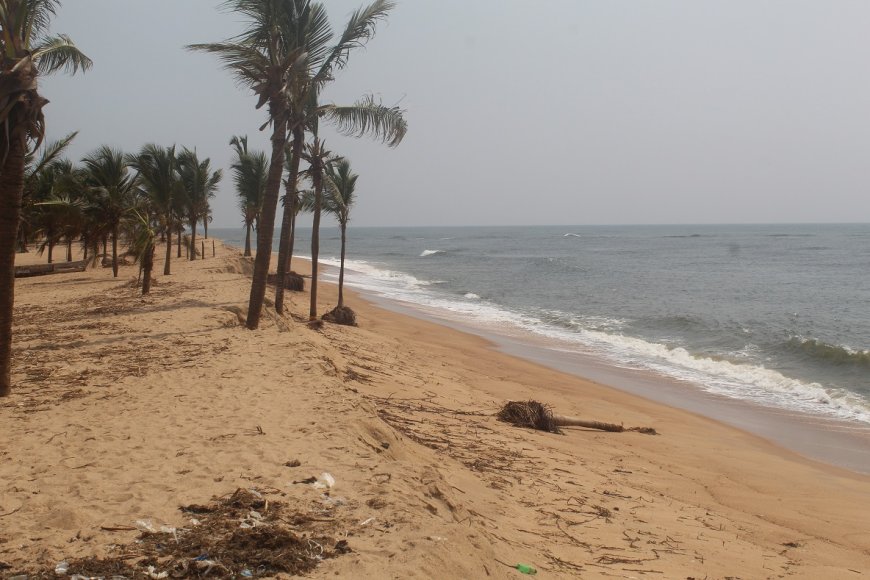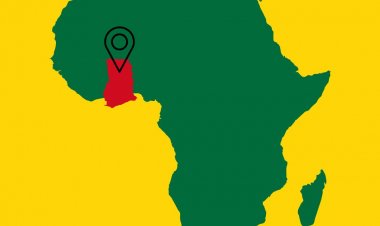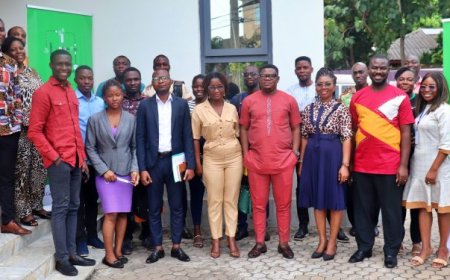Executive summary
Context of the study
Without a doubt, the effects of climate change are increasingly being felt in African nations, with the most severe impacts experienced by the poorest and most vulnerable populations. These effects include land degradation, loss of biodiversity, water scarcity, decreased agricultural productivity, hindered economic growth, food insecurity, health risks and a decline in agroecological productivity due to rising temperatures and shifting precipitation patterns. Ghana, like many other African economies, is highly susceptible to climate change and its associated shocks, posing significant risks to its economic and human development.
Against this background, Ghana is actively implementing climate change adaptation policies and actions aligned with its Nationally Determined Contributions (NDCs). However, although adaptation priorities emphasise the importance of local implementation, the extent to which local needs, priorities, strategies and challenges are integrated and emphasised in these efforts in Ghana, particularly at the community level, remains unclear. To address this, the Africa Policy Research Institute (APRI) partnered with the Ghana Climate Innovation Centre (GCIC) to launch the ‘Climate Adaptation Strategies, Practices, and Initiatives in Ghana: Issues and Pathways’ project. This project explored climate change adaptation policies, strategies and local actions in Ghana, identifying barriers and enabling factors for adaptation to inform the country’s NDC implementation. It highlights locally led adaptation (LLA) strategies, practices and lessons that can inform and guide the implementation of the NDCs and climate actions at the local and national levels. More specifically, the project sought to understand and document:
- status, needs and priorities for climate actions in Ghana;
- adaptation priorities and needs of local communities;
- available policies, strategies, practices and initiatives at national and community levels to address adaptation needs;
- challenges and barriers hindering LLA actions in Ghana;
- potential opportunities and entry points to support and encourage effective and sustained adaptation action for at-risk and vulnerable communities;
- recommendations for advancing local adaptation as a key component of Ghana’s NDCs.
Approach and methodology
This qualitative study employed multiple research methods. It began with a comprehensive review of the literature and relevant climate change documents to establish the existing knowledge and policy landscape. This was followed by mapping exercises to identify climate change policies, strategies, local actions and key stakeholders in the country.
Stakeholder engagement played a crucial role in gathering insights and perspectives. Two policy-convening workshops were conducted, bringing together senior officials from various institutions involved in climate action. These workshops provided a platform to discuss successes, challenges and progress related to LLA efforts in Ghana.
To gain in-depth understanding informed by the literature review and inputs from key stakeholders, three case studies were selected. The case studies represent different ecological zones and geographical categories:
- Case study I focuses on a livelihood-strengthening project that is empowering women in climate-vulnerable communities to use organic shea processing and village savings and loans to build resilient livelihoods in response to the changing climate.
- Case study II focuses on a project where farmers have embraced climate-smart agricultural practices, such as conservation farming, to mitigate the impacts of erratic rainfall patterns.
- Case study III focuses on community-based disaster risk reduction efforts in the Keta-Ada stretch to address coastal erosion and climate change impacts. It highlights locally led initiatives, including community engagement, use of dual canals, nature-based solutions and awareness programmes, to enhance resilience and reduce vulnerability.
Through field observations, focus groups, interviews with key informants and engagement with relevant stakeholders, primary data was collected to examine the enablers of and barriers to climate change adaptation actions and their impact on livelihoods. The research design aimed to provide a nuanced understanding of the complex dynamics of climate change adaptation responses in Ghana. By combining a literature review, mapping exercises, stakeholder engagement and case studies, the study aimed to generate valuable insights into the implementation of the NDCs through LLA.
Key findings
Status, needs and priorities for climate actions in Ghana
Ghana faces significant climate change impacts, including coastal erosion, droughts and floods. Climate change has had significant impacts on key sectors of the Ghanaian economy, including agriculture, health, coastal resources and natural resources.
Ghana has developed and updated its NDC to accelerate climate action. The updated NDC emphasises 13 specific adaptation measures out of a total of 47 programmes of action. Key priority areas for adaptation in Ghana include the development of resilient infrastructure, the promotion of livelihoods, strengthening of agricultural landscapes and food systems, urban planning, early warning systems, enhancing the climate resilience of women and vulnerable groups and promoting social inclusion.
Available policies, strategies, practices and local actions
- In addition to the NDC, the research found existence of several policies and strategies that support Ghana’s climate change agenda. These include the National Climate Change Policy (NCCP), the National Climate Change Adaptation Strategy (NCCAS) of 2012, the 2015 NDCs, the National Climate Change Master Plan Action Programmes for Implementation (2015–2020) and the National Adaptation Policy Framework (2018), all of which guide climate actions and initiatives.
- Key implementation strategies to build adaptive capacities at the local level include climate information services, integrated landscape planning, sea defence walls, early warning and disaster risk management, integrated water resource management, resilient community infrastructure, crop insurance and promoting opportunities for improving the livelihoods and resilience of women and vulnerable groups.
- Climate actions in Ghana involve a wide array of stakeholders, including technical agencies, directorates, non-governmental organisations (NGOs), the private sector, academic institutions and international organisations. However, there is growing recognition among stakeholders that the on-the-ground implementation of adaptation actions at the sub-national level is still insufficient.
Motivations and outcomes of LLA practices
- Local communities engage in various adaptation practices, such as climate-smart agriculture, soil conservation, diversification of livelihoods and ecosystem-based approaches. Local communities are motivated by various factors to engage in adaptation practices, such as improvement of rural women’s livelihoods and incomes, restoration of degraded ecosystems, protection of livelihoods, assertion of individual and community agency, enhancing resilience and compensating for government inaction.
- Identified LLA practices and strategies included: Case I – Village Savings and Loan Associations (VSLAs), energy-saving stoves, local by-laws against logging and tree planting and climate-smart agriculture; Case II – tree planting, organic farming and solar-powered irrigation; Case III – building structures to prevent erosion, restoring mangrove forests, practising beach nourishment and creating water passages. These practices aligned with a number of NDC priority sectors as well as other national policies addressing climate change.
- The results of the study show that these strategies and practices are enabling communities to reduce vulnerabilities and improve livelihood opportunities. They are also improving the understanding of climate impacts such as floods, and fostering collaboration and community cohesion.
- Additionally, the adaptation measures offer co-benefits such as reduced economic losses, enhanced health and safety and reduced vulnerability to future disasters, financial literacy, conflict resolution and access to credit for women.
- Lessons learned emphasise the importance of community involvement, community needs and priority-based solutions, holistic approaches and strategies tailored to local contexts.
Challenges and barriers hindering LLA actions
- Limited financial resources hinder the implementation of LLA actions.
- Inadequate institutional coordination and policy gaps pose challenges to effective adaptation planning and implementation.
- Many communities face challenges in receiving support from government institutions and other relevant organisations.
Potential opportunities and entry points for effective adaptation action
- Strengthening community engagement and participation in decision-making processes can enhance the effectiveness of adaptation actions.
- Building partnerships and collaboration between government, civil society and the private sector can leverage resources and expertise for climate adaptation initiatives.
Main recommendations
The research findings and conclusions in this report provide important messages and recommendations for policy makers and stakeholders involved in climate action and adaptation in Ghana and other African countries to ensure that communities are better equipped to address the challenges of climate change in their local contexts:
- Be clear about the ‘local’ in LLA: ‘Local’ can refer to a region, a district, a zonal area or a specific community. Resources and initiatives can move from the centre or national level to a district and may not necessarily reach the community level that needs such resources the most. As a result, a starting point for deepening LLA is to develop a clear focus on what ‘local’ means in LLA actions, in order to better direct efforts and resources.
- Devolve and enhance access to financial resources: Develop mechanisms to improve access to financial resources for local governments and communities, especially for small-scale farmers, women’s groups and community-based organisations involved in climate adaptation initiatives. This can include targeted funding programmes, microfinance schemes and partnerships with financial institutions to prioritise support for local adaptation actions.
- Strengthen capacity-building efforts: Invest in capacity-building programmes to empower local communities with the knowledge, skills and tools needed to design and implement climate adaptation strategies. This includes providing training on climate-smart agriculture, sustainable land management, ecosystem restoration and disaster risk reduction.
- Recognise and support local climate change practices, strategies and initiatives: Traditional knowledge and practices have enabled local communities to adapt to climatic variability over time. Policy makers should recognise and build on these practices in the design and implementation of adaptation initiatives. These practices, strategies and initiatives are critical for building resilience to climate change at the local level and contribute to achieving national climate goals.
- Foster participatory decision-making processes: Promote inclusive and participatory decision-making processes that involve local communities, indigenous groups and other stakeholders in the planning, implementation and evaluation of climate adaptation policies and programmes. This ensures that local knowledge, needs and perspectives are integrated into decision-making processes.
- Support knowledge-sharing and learning networks: Establish platforms for knowledge-exchange and learning networks that facilitate the sharing of best practices, experiences and lessons learned among local communities, practitioners, policy makers and researchers. This can include workshops, conferences, online platforms and community-led knowledge-sharing initiatives.
- Integrate traditional knowledge and practices: Recognise and integrate traditional knowledge and practices into climate adaptation strategies. Local communities often possess valuable traditional knowledge and practices that have been developed over generations to cope with environmental changes. Incorporating these approaches can enhance the effectiveness and cultural appropriateness of adaptation actions.
- Strengthen local institutions and governance structures: Build the capacity of local institutions and governance structures to effectively coordinate and implement climate adaptation actions. This includes supporting the establishment of community-based organisations, strengthening local governance systems and promoting collaboration and partnerships between local governments, civil society organisations and communities.
- Mainstream adaptation into development planning: Integrate climate adaptation considerations into national and local development plans, policies and strategies. This ensures that climate resilience becomes a cross-cutting priority in all sectors, including agriculture, water management, infrastructure development and disaster risk reduction. Mainstreaming adaptation helps to align local actions with national priorities and facilitates the allocation of resources for climate resilience.
Recommendations for the international community
Based on the research, we have some policy recommendations for the international community to enhance effective locally led climate adaptation:
- Increase international climate finance for LLA: Provide increased funding and financial resources specifically dedicated to supporting locally led climate adaptation initiatives. This can be done through the establishment of dedicated funds, grant programmes, and financial mechanisms that prioritise and allocate resources to local communities and organisations.
- Strengthen capacity building and knowledge sharing: Support capacity-building programmes and knowledge-sharing platforms that facilitate the exchange of best practices, lessons learned, and experiences between local communities, practitioners, and policy makers from different countries. This can include funding training programmes, workshops and conferences that focus on enhancing the skills and knowledge of local actors in climate adaptation.
- Foster collaboration and partnerships: Encourage collaboration and partnerships between international organisations, governments, NGOs and local communities to enhance locally led climate adaptation efforts. This can involve establishing networks, platforms and forums for dialogue and cooperation, and promoting the sharing of resources, expertise and technology transfer.
- Promote policy coherence and integration: Foster policy coherence at the international level by aligning climate adaptation policies, strategies and funding mechanisms with locally led approaches.
Insights into Ghana's climate change policies, initiatives and local actions
About the Authors
Dr. Albert Arhin is the Lead Researcher for the project “Climate Adaptation Strategies and Initiatives: Issues and Pathways in Ghana”. Dr. Arhinis is a sustainability expert with more than fifteen years of experience in research, technical support and strategic planning in climate change, REDD+ and land restoration policies, green economy and sustainable development. He previously worked as a Research and Policy Manager for Oxfam in Ghana. He has also worked on multi-disciplinary projects designed to generate evidence to inform policy, practice and academic discourse. He was also a Research Fellow with the Bureau of Integrated Rural Development (BIRD) of the Kwame Nkrumah University of Science and Technology (KNUST), Ghana, and a lecturer at the Department of Planning, KNUST, Ghana. He holds a PhD in Geography from the University of Cambridge, UK.
Richard Oblitei Tetteh is a Research Assistant for the project “Climate Adaptation Strategies and Initiatives: Issues and Pathways in Ghana”. Richard is an Agricultural Extension and Development Specialist with over four years of experience in stakeholder engagement, sustainable rural development, climate change studies, monitoring and evaluation studies, social research, workshop facilitation, and project planning and management. He has served as a Research Assistant for several projects awarded by multilateral organizations such as USAID, UNFPA, UNICEF, OXFAM, GIZ, FAO, International Cocoa Initiative (ICI), Verite, Action Aid Ghana, and SEND-Ghana. Richard holds a Bachelor of Science (BSc.) degree in Agricultural Extension and Rural Sociology from the Kwame Nkrumah University of Science and Technology (KNUST), Ghana, and is currently a Postgraduate student at the KNUST pursuing Master of Philosophy (MPhil) in Agricultural Extension and Development Communication.




